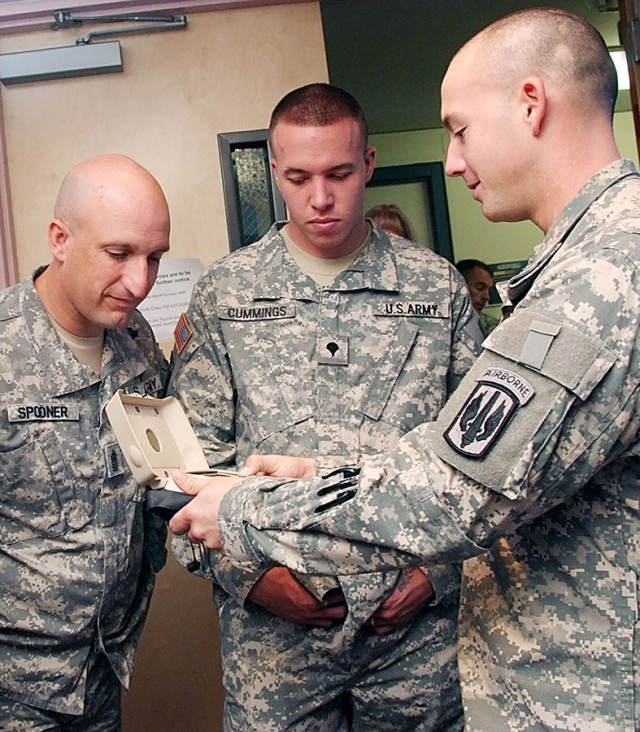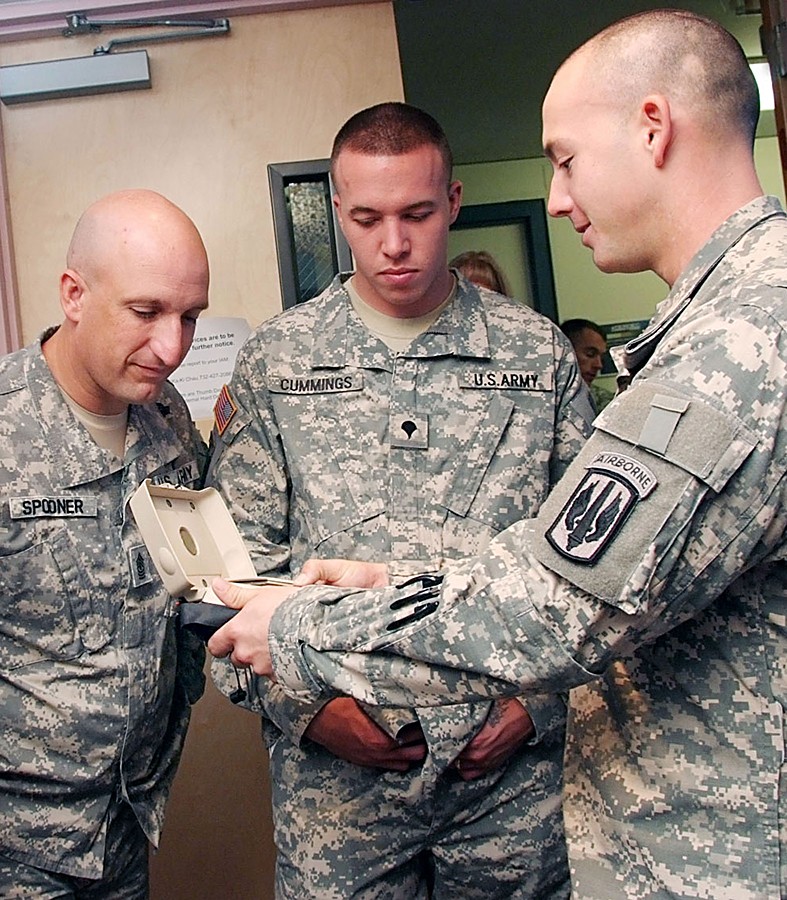Soldiers from the Army's 82nd Airborne Division continue their two-week tour of the U.S. Army Research Development and Engineering Command's facilities and are using the opportunities to collaborate with the engineers and scientists who develop much of the Army's technological solutions to battlefield needs.
The Soldiers toured various laboratories at the U. S. Army Communications- Electronics Research, Development and Engineering Center, Fort Monmouth, N.J., as well as those U.S. Army Natick Soldier Research, Development and Engineering Center, Natick, Mass. Visits like these are providing engineers first-hand feedback from Soldiers with current battlefield experience while giving the engineers and scientists the opportunity to explain some of the capabilities they are working on in their labs.
"It's important for our engineers at CERDEC to receive input from Soldiers out in the field. These guys have been out there fighting; they are out there in the trenches every day," said Sgt. 1st Class Eric Scheidt, CERDEC senior enlisted advisor, who helped organize the visit.
The 82nd Airborne's stops included labs for night vision and electronic sensors, command and control, space and terrestrial communications, information warfare.
Col. Michael Hummel, the military deputy for night vision and electronic sensors said," The work we do and the technology we develop cannot be perfected without the feedback from the Warfighter."
Recently returning from deployments to Iraq or Afghanistan, the Soldiers voiced their concerns with equipment in the field, and discussed possible improvements with the engineers.
"I think it's great both so that we understand the system to where we're down on the receiving end and we don't understand 'why did they give me this', 'this doesn't make any sense,' and also for them to get direct feedback from us," said Capt. Jonathan Gowin, 82nd Airborne Division. "Sometimes it's the bigger picture that we aren't necessarily seeing on our side, and this will expand knowledge for both developers and users."
At Natick, the Soldiers got up close to the latest developments in the areas of helmet technology, combat feeding and aerial delivery.
One area that was highlighted was low-cost, low-altitude (LCLA) aerial resupply. John Mahon, Aerial Delivery Engineering Support Team, discussed how LCLA is being used in Afghanistan with great success. During a discussion that ensued regarding personnel parachute systems and upcoming changes, 1st Sgt. Kevin Spooner, the 82nd's noncommissioned officer in charge, mentioned how equipment changes can affect parachute jumps.
"It can get you off-kilter," he said. Spooner added that each time there is weight added to someone who is jumping it can reduce how long you can sustain yourself due to other items that have to be left behind.
Not all of the concerns from the Soldiers revolved around technology solutions. Sometimes, their interest focused on more basics needs. For example, there was concern about a rumor that Tabasco Sauce was going to be pulled from the MREs.
"Our motto is 'Warfighter Recommended, Warfighter Tested, Warfighter Approved,' so we only add or remove items from rations based on what the warfighter wants. Tabasco Sauce is a highly rated component of the MRE, so we have no reason to take it out," said Katelyn D'Alessandro from NSRDEC's Combat Feeding Directorate. "What we are looking at is changing from the glass bottles to flexible pouch packaging which will result in huge cost savings," she explained.
The visitors had a chance to see how the Army runs sensory evaluations---rating odor, appearance, flavor and texture. They even got to participate in a sample evaluation. In discussing upcoming improvements to the Meals, Ready-to-Eat (MREs), the 82nd's Sgt. Steven Martin commented, "It must be a tough job trying to make everyone happy."
First hand experiences in the labs have broadened the awareness of these battle-tested 82nd Soldiers. "I never thought I'd see myself out here, looking at all this new stuff that they are coming up with," said Spc. Adam Nystrom. "Something I'm looking to gain from this is to take all this information back to my company and captain, and look into getting this stuff for us, so it will make our job and our lives a lot easier."


Social Sharing